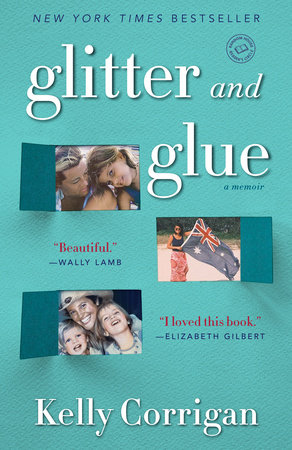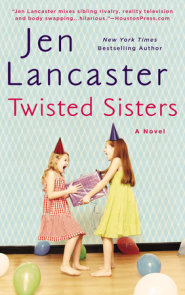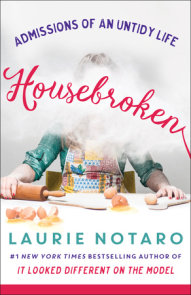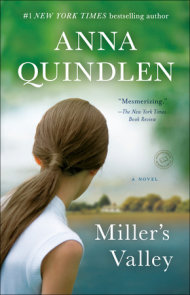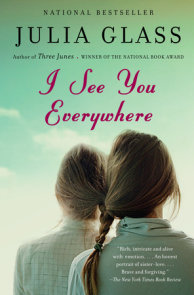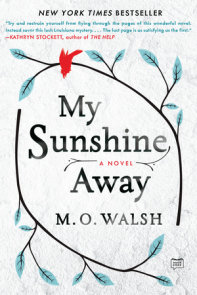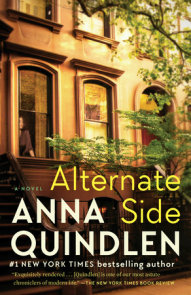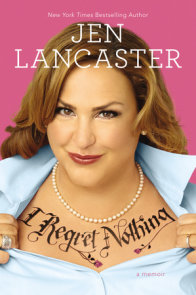READERS GUIDE
A Conversation Among the GenerationsJuly 26, 2014
Last summer, the girls and I visited my parents at Wooded Lane. On our last night (of possibly a few too many), we were told to meet in the TV room at 4:55 p.m. to watch a horse race, one of my mom’s favorite things to do, though after fifty-two years as my father’s wife, she has acclimated to all spectator sports (not to mention all sports commentary, e.g., ESPN’s Pardon the Interruption). “Our horse is number seven, Sierra Alpha,” Jammy explained, because Sierra Alpha was trained by her best friend’s grandson. Turns out, our horse ran a strong race to finish second. Things were looking up.
We moved to the kitchen table for drinks (the girls had the sugar-free cranberry juice my mother bought to placate me) and to play a few rounds of Rummikub. Claire, eleven, won repeatedly, while Georgia, nearly thirteen, pretended not to care. We switched then to King and Scum, a card game Tracy Tuttle and I learned from some Sigma Chi’s in college. Hanging over my head was an assignment from Jen Smith, my editor, God love her, who had asked me more than once if I might be able to capture a conversation with my mom to include in the back of the paperback. I explained to her that this sort of thing—introspecting about interpersonal relationships—ran a high risk of making my mom’s skin visibly slither, but alas, I love Jen Smith, not to mention my readers, so I tried. Here’s what happened:
Me [opening my laptop]: So, Ma, I gotta ask you a few questions before we leave tomorrow.
Jammy [ignoring me, talking only to the girls, referring to her black T-shirt that says grandmas gone wild in small rhinestones affixed by a professional grade BeDazzler]: I wore my diamonds tonight. Don’t you like my diamonds?
Claire: I love them. Jammy’s gone wild.
Me: Nice, Ma.
Georgia [looking up from her cell; frowning at my fingers as they skip around the keyboard]: Mom, you aren’t putting this all in your thing, are you?
Me: Yes, all of it. Okay, so Mom, what are some of the differences between my mothering style and yours?
Jammy [eyeballing my laptop]: I don’t use my computer 7/24.
Georgia [laughing]: Jammy, it’s 24/7!
Claire: 7/24! Jammy said 7/24—
Jammy: 24/7! Whatever. Just wait till you get old.
Me: So, yes, okay, well, other than computers and technology—
Jammy: And iPhones . . .
Me: And iPhones, yes. But all that’s my whole generation. What are some of the more specific differences between the way you and I parent?
Jammy [shuffling the deck, ready to be done with this nonsense]: I think you have more highs and lows than I had. I was more even-keeled. More down the middle. I think you’re very easy sometimes, and then at other times you get very worked up, more stressed, more agitated.
Me [deciding whether to push back or quietly take offense]: Okay, interesting. Duly noted. Moving on: Who do you think was more strict—you or me?
Georgia: Jammy is definitely more strict.
Jammy: Don’t say more strict, Georgia. It’s stricter.
Claire: Me too. I think Jammy is more strict.
Jammy: Stricter, Claire. For heaven’s sake, Kelly, do these girls learn grammar in school?
Georgia: We’re on vacation.
Jammy: Grammar never takes a vacation.
Me [ignoring the grammar talk, except to recall with a smile my backup idea for a title, Poetry and Prose]: Really girls? You don’t think I’m stricter?
Georgia [looking at me]: I’ve had Jammy as a grandmother and she’s way more stricter than you.
[My mother and I share a long, surprised look. Absurd, our expressions say in unison. Jammy is a fool for my girls, an absolute bleeding heart.]
Me: Compare me as a kid and the girls now. How was I different?
Jammy: They’re full of it, I’ll say that, but you were very opinionated. You let me know exactly what you thought about everything. Every. Little. Thing.
Greenie [having wandered over, now laughing in agreement]: You were very verbal, Lovey.
[We are all smiling now. I’m still “verbal.” An easy joke among my friends is that where any crowd gathers—a line at Target, say—I’m liable to flip over the nearest shopping basket and speak out on some issue that I’ve been working through, and I’m always working through some issue.]
Claire: I have a question. What’s the hardest part about being a mom?
Me: I hate not knowing what to do. There’s a lot of times that I don’t know what to do. I thought I was going to be more sure—
Jammy: More sure? Good grief. Surer.
Georgia: Oh my God, Jammy.
Jammy: God? Are we going to church? Are we praying now?
Me [addressing Claire]: I thought I would be surer. But then, and this happens all the time, some situation will bubble up and I’ll be totally lost, or torn. Like you’ll ask to go to some concert, or for some expensive flat iron, and I don’t know whether to give it to you or not. I can’t even decide how late to let you stay up on a school night. And I don’t know how to teach you about money, like whether or not you should have an allowance, how many chores, how many bathing suits.
Georgia: More than one!
Me [suddenly really needing to get this out]: And I often don’t know what’s fair to expect of you, like whether I should punish you for losing your Stanford sweatshirt or forgetting to feed the dog . . . I mean, I lose things. I forget things.
[Georgia nods as if she’s been waiting for me to notice this for years.]
Me: I know I have to pick my battles—I get that—but I find it hard to figure out which ones to pick. [To my mom] You knew, Ma. You always knew. You were dead sure.
Jammy: No, I wasn’t. Never. [I am wide-eyed.] I pretended.
Greenie [looking at me]: She pretended. She pretended beautifully.
Me: Wow. I’m stunned.
Georgia: You don’t pretend, Mom. I can totally tell when you don’t know what to do.
Me [still staring at my mother]: You were bluffing?
[Claire burps.]
Jammy: Very ladylike.
Georgia: Jammy, Claire burps 7/24.
Jammy: Very funny.
Georgia: One thing about you as a mom, Mom, you’re very open with us. You’re, like, emotionally open. I can read you. Like, I know when you say Dad and I are going to talk about it, that means you don’t know what to do.
Claire: And you’re very open to our ideas.
Georgia: Oh, I totally disagree.
Claire [to Georgia]: No, she negotiates. Like if we want a new lacrosse stick or an app, we can try to cut a deal.
Georgia: She’s a compromiser, I guess, sometimes. Except when the wall comes down—like when we wanted to watch Step Brothers, and then, no way, you are not open for business.
Claire: Yeah, you have two sides to you. Your right side and your left side. [Cracking up.]
Georgia: Oh my God, Claire.
Jammy: We certainly are praying a lot tonight, aren’t we?
Me [giving the hush-up wave to the girls]: Okay, Ma, did you ever think I would be a writer?
Jammy: Definitely. You loved to write. Even when you worked at United Way, I still thought you would be a writer. You were very expressive. You are very expressive. [Handing Georgia a few plates] Take this over, Sugar.
Georgia: One sec.
Jammy [feigning shock]: Excuse me? You know what I used to tell your mother: Obey instantly, without comment.
Georgia [taking the plates over to the sink]: More strict.
Claire [to Jammy]: Who is more difficult to take care of: us or your kids?
Jammy: Well, I can spoil you girls. With your mother and your uncles, I had to constantly say No. That’s the job. I was the glue.
[I’m nodding. Glitter and Glue was definitely the right title]
Jammy: Being a grandmother is wonderful. [Looking at me, bemused] Shame there’s only one way to get here. [To the girls] You are the glitter of our golden years.
Greenie: That’s what we say, Lovey: Our grandchildren are the glitter of our golden years.
Me: Is there anything I do that makes you think, Oh, she got that from me?
Jammy [flatly]: No. I can’t think of anything.
Me: Really?
Jammy: Not my religion, you barely know who Barry Goldwater was, and you don’t play bridge.
Me: Don’t you think I got the whole girlfriend thing from you? The Pigeons . . .
Jammy [brightening]: Yes! There’s something. Definitely. When I see you with Betsy or Tracy or Michelle Constable, I think, She’s a Pigeon-in-Training.
Me: Anything else?
Jammy: No.
Me: Okay, so how were you different with me than with Booker and GT?
Jammy: I don’t know. I didn’t raise the three of you the same.
Me: Right. So how?
Jammy: I don’t know. You needed different things.
Me: Like . . . ?
Jammy: Oh I don’t know. [Waving me off] I don’t like these conversations. It’s like you watching Bill O’Reilly. I don’t make you watch Bill O’Reilly, do I?
Me: You’re not going to answer these questions, are you?
Jammy: Let’s just play cards. Can’t we just play cards?
Me: Sure.
I asked her the next morning if she was glad I turned out to be a writer. She said, “Sure, I guess.” Suddenly anxious, I asked her if she ever wished that I didn’t write Glitter and Glue. “Absolutely not. I love that book. I think it’s your best one.” I said, “Well, I would think so. I mean, it’s all about you.” But she assured me that her assessment had nothing whatsoever to do with her portrayal as a tireless maternal genius. She just thought my writing “had gotten a lot tighter.”
After a pause, her hands back in the sink, where there were dishes to be done, she said, “Now can this be over?”
Now this can be over, Ma. Except to include this final photo of a vivacious knockout in her prime, a frank and complicated woman I would have loved to have been seated next to that evening, to have known as a peer, so that maybe it wouldn’t have taken me forty years to appreciate her properly.
Questions and Topics for Discussion
1. As a young woman Kelly thinks, “Things happens when you leave the house,” and books a round-the-world trip to Australia. Do you think that these types of adventures are necessary to gain life experience? Does Kelly’s maxim change by the end of the book?
2. Milly and Martin respond differently to Kelly’s entry into their lives. Why do you think this is? When (if ever) do things begin to change with Milly?
3. Like the characters in the book My Ántonia, Kelly wants to be someone important to Evan. What does she mean by that? Based on what Kelly reveals about Evan at the end of her story, do you think she was successful? Why or why not?
4. During her time in Australia, Kelly realizes that it’s only when she’s away from her mother that she can appreciate her forthright, often unyielding nature and the role she played in Kelly’s childhood. Have you come to see anything more clearly about your own mother over time?
5. Kelly often hears her mother’s voice in her head, offering advice and reciting her maxims as she tries to care for Milly and Martin. Has something similar ever happened to you? Does your mother have rules to live by?
6. What is the significance of Walker the American? How does he influence Kelly’s understanding of life experience?
7. Do you think daughters’ relationships with their fathers are inherently different from their relationships with their -mothers? Does Kelly’s relationship with Greenie support this? What does the fact that Mary kept Kelly’s shoplifting a secret from her father suggest?
8. John Tanner is working hard and quietly to raise his kids when Kelly arrives. How does he change over the course of the book? How would you have tried to help him adjust to his new circumstances?
9. When Kelly works at her mom’s real estate agency, she is shocked to hear co-workers describe her mother as “the life of the office” (page 87). Why is this an important moment for Kelly? How is your perception of your own mother different from her friends’ and colleagues’ perceptions?
10. On page 146, Kelly explains the phenomenon called “Reader Response.” Did you find yourself interpreting Glitter and Glue through the lens of your own personal experiences? Is it possible to read any book without automatically subconsciously comparing it to your own life?
11. Kelly remembers many vivid moments from her stay with the Tanners, including her trip to the beach and Martin’s tantrum walking home from school. Why do you think Kelly still thinks about the Tanners? Why do you think she chose to write this story after her cancer scare?
12. Of all the ideas juxtaposed in these pages—mothers and fathers, adventure and life experience, stepping out and stepping up—which resonate the most with you? Why?
13. On page 47, we learn where the title Glitter and Glue comes from. What do you think of having one parent as the glitter and another as the glue? Is this what it was like in your own family? Was this always the case?
14. Kelly often says that, for her, Glitter and Glue is fundamentally about acceptance, which she calls “the Mt. Everest of emotions . . . hard to get there, hard to stay there.” She defines acceptance as the moment you “actually stop trying to change someone, not because you’ve given up but because you finally realize that their way of being in the world is the right way for them.” Have you experienced this level of acceptance, either as the person accepted or the person accepting?
15. Kelly also talks about the difference between like and love, something she learned through her relationship with her mom. She says she “used to think love was just a whole lot of like but now she sees that you can like people you might never be able to love and you can love people deeply that you don’t particularly like.” Do you have any relationships that fall into either of these categories?









